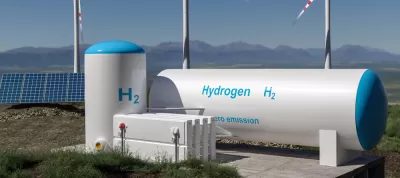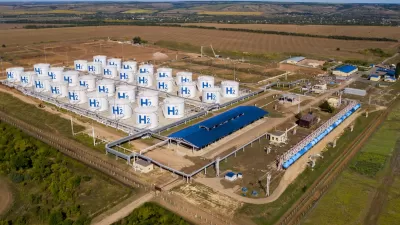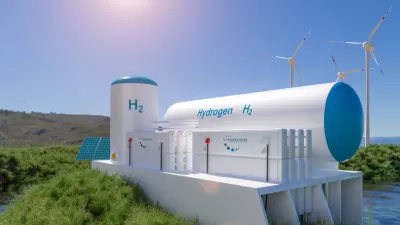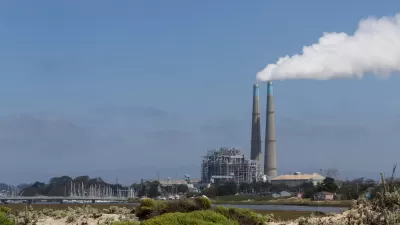The U.S. Department of Energy announced two new programs last month that are funded by the $1.2 trillion Infrastructure Investment and Jobs Act: $7 billion to create regional ‘hydrogen hubs’ and $4.9 billion to ‘manage and store carbon pollution.’

“The U.S. Department of Energy today opened applications for the $7 billion program to create regional clean hydrogen hubs (H2Hubs) across the country, which will form a critical arm of America's future clean energy economy,” states the department's news release (source article) dated September 22.
As part of a larger $8 billion hydrogen hub program funded through President Biden’s Bipartisan Infrastructure Law, the H2Hubs will be a central driver in helping communities across the country benefit from clean energy investments, good-paying jobs, and improved energy security – all while supporting President Biden’s goal of a net-zero carbon economy by 2050.
The program “will be one of the largest investments in DOE history” and will be managed by DOE’s Office of Clean Energy Demonstrations established a month after the infrastructure bill was signed to accelerate clean energy technologies.
For this initial funding opportunity launch, DOE is aiming to select six to ten hubs for a combined total of up to $7 billion in federal funding.
As part of the Department’s commitment to accelerating the national deployment of clean hydrogen fuel, DOE also released a draft of the National Clean Hydrogen Strategy and Roadmap [121-pg. PDF] for public feedback.
Clean hydrogen should not be confused with so-called green hydrogen made strictly from electrolysis using renewable power. Page 6 of the aforementioned document indicates that clean hydrogen can additionally be sourced from natural gas, coal, nuclear energy, and biomass.
Robert Walton, an energy reporter for Utility Dive, dove into the document further, providing a more precise description of clean hydrogen: It sets “a target of 4 kg CO2e per kgH2 for lifecycle greenhouse emissions associated with hydrogen production,” he wrote on September 23.
Carbon Management
The day after releasing the new $7 billion hydrogen program, the Energy Department “announced a nearly $4.9 billion set of funding opportunities to bolster investments in the carbon management industry and to significantly reduce carbon dioxide (CO2) emissions released into the atmosphere through power generation and industrial operations.”
“Nearly every climate model makes clear that we need carbon management technology—especially in hard to decarbonize sectors and heavy industries such as steel and cement production—to tackle the climate crisis,” said U.S. Secretary of Energy Jennifer M. Granholm.
The September 23 press release details the three funding opportunity announcements that collectively tackle climate-changing carbon dioxide emissions:
- Carbon Storage Validation and Testing
- Carbon Capture Demonstration Projects Program
- Carbon Dioxide Transport Engineering and Design
Related:
- Energy Department Resumes Loan Program with Hydrogen Storage, June 21, 2022
- Biden Commits Federal Government to Carbon Neutrality, December 8, 2021
- More Details of the $1.2 Trillion Federal Infrastructure Bill, November 21, 2021
-
Green Hydrogen, Plus Storage, Key to Los Angeles' Plan for Carbon-Free Electricity, December 22, 2019

Planetizen Federal Action Tracker
A weekly monitor of how Trump’s orders and actions are impacting planners and planning in America.

Congressman Proposes Bill to Rename DC Metro “Trump Train”
The Make Autorail Great Again Act would withhold federal funding to the system until the Washington Metropolitan Area Transit Authority (WMATA), rebrands as the Washington Metropolitan Authority for Greater Access (WMAGA).

The Simple Legislative Tool Transforming Vacant Downtowns
In California, Michigan and Georgia, an easy win is bringing dollars — and delight — back to city centers.

The States Losing Rural Delivery Rooms at an Alarming Pace
In some states, as few as 9% of rural hospitals still deliver babies. As a result, rising pre-term births, no adequate pre-term care and "harrowing" close calls are a growing reality.

The Small South Asian Republic Going all in on EVs
Thanks to one simple policy change less than five years ago, 65% of new cars in this Himalayan country are now electric.

DC Backpedals on Bike Lane Protection, Swaps Barriers for Paint
Citing aesthetic concerns, the city is removing the concrete barriers and flexposts that once separated Arizona Avenue cyclists from motor vehicles.
Urban Design for Planners 1: Software Tools
This six-course series explores essential urban design concepts using open source software and equips planners with the tools they need to participate fully in the urban design process.
Planning for Universal Design
Learn the tools for implementing Universal Design in planning regulations.
Smith Gee Studio
City of Charlotte
City of Camden Redevelopment Agency
City of Astoria
Transportation Research & Education Center (TREC) at Portland State University
US High Speed Rail Association
City of Camden Redevelopment Agency
Municipality of Princeton (NJ)





























